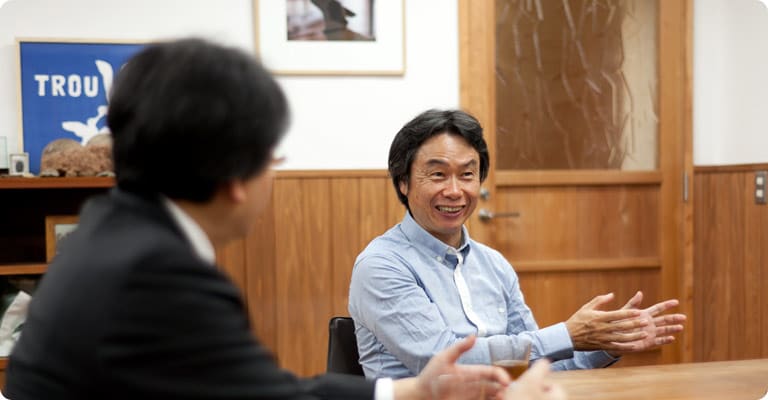You Need to Be Able to Reconcile Outside Interests
But I've never thought of myself as someone who could pick up on tiny details like that. The one thing that I do pay attention to is whether something looks superficial.
"Something superficial."
Right. As I make something, I try to be very conscious about making sure it's not superficial. So while I'm monitoring, I pay a lot of attention to seeing whether or not the game that person is playing feels superficial.
Oh, whether it's superficial or not.
Right. Whether it's superficial or complex.
Could you explain more clearly what kind of things feel superficial to you?
In terms of its feel, when I can feel a solild response, I can sense layers of the substance to it. What else? Let's see… For example, something that never exceeds my expectations is superficial. Also when there are things that are really implausible without any explanation of how they might be possible. I really hate when issues like that are really numerous.
It ruins it for you.
I hate it when you can see what's going on behind the scenes. Video games are all run with programs, and I hate when a game is made within in the scope of someone in the industry and nothing is done to cover up the things that the public would think was odd if they saw it. I hate when you can see those parts.
Right, right.
When those issues crop up in a game I'm working on, I go through and fix them one by one.
That counts as a form of criticism. Self-criticism.
That's true.
When you get something superficial like that, they're usually just making it for the sake of their convenience, whether it be for the person making the game, or for the company. They realize it's not right, but it's passable, so they end up releasing it like that.
Right, right!
I'm not saying that we must completely ignore what will be convenient for us, though.
No, but when they end up going with what's most convenient for them, they've got their priorities mixed up. And that's dangerous.
Oh, that's true.
That's why, even when there are extenuating circumstances, and other interests in play, you need to be able to reconcile them. It's not good to think only about your conveniences.
If we'd only been thinking about what was most convenient for the company when we made this new game The Legend of Zelda: Skysward Sword, we probably would have put a half-finished product on sale last Christmas by saying that we have managed to make it on time just because it was the order from the company.
Oh, that makes sense.
If I had said last Christmas, "We need something to be our big end of the year product. Make a new Legend of Zelda game," you would have made some sort of game. Because you would have spent as much time as you had and put in as much energy as you could to make it.
But it wouldn't have been this Legend of Zelda.
No, it wouldn't.
Absolutely not.
In other words, you needed a whole year to finalize this game to make it complete.
Right. We spent 6 months making the game, and another 6 months fine-tuning it.
The work you did after the actual game was put together to near-final format was really important.
Yeah. Because the game we were making was so huge, we needed to work that hard on it. Otherwise it would have felt like a waste. We spent so much time making a really good game and it came out so well that it would have been a waste not to make sure that it was really polished.
You came up with so many interesting elements while you were making it, and you spent a long time at the end making sure that those elements were included in the game. That's what made it so dense.
Yeah.
Wow…
